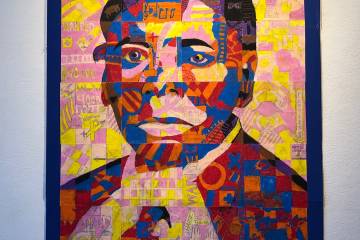Supported by a $2.36 million grant from the National Science Foundation, experts at Johns Hopkins University's schools of Engineering and Education are working with educators and administrators in Baltimore City Public Schools on an out-of-school program aimed at enhancing high school students' mastery of and confidence in algebra—a subject that research shows is often a stumbling block to later participation in science, technology, engineering, and mathematics education and careers.
The Baltimore Online Algebra for Students in Technology, or BOAST, program will be offered to 9th and 10th graders in 37 city schools starting in fall 2021. Comprising a combination of recorded lessons, hands-on engineering projects, events, and activities—all online and available 24 hours a day to allow students to participate when it is convenient for them—BOAST has been designed to not only reinforce students' mathematics skills, but also to advance their interest in engineering and other STEM fields.
"The goals of the program are to help students with a growing interest in engineering to maintain that interest throughout the often emotionally and socially challenging—and distracting—transition that many students experience in the beginning years of high school," said Michael Falk, co-developer and BOAST principal investigator.
A professor of materials science and engineering at Johns Hopkins Whiting School of Engineering, where he is also vice dean of undergraduate education, Falk also was PI for STEM Achievement in Baltimore Elementary Schools, or SABES, a five-year partnership between Johns Hopkins University and City Schools that launched in 2012 and was supported by a $7.4 million National Science Foundation grant. As a result, the SABES science curriculum is being used in all city public elementary schools.
BOAST is a collaborative effort between Hopkins Engineering and Education, City Schools, Building STEPS, the Johns Hopkins University Applied Physics Laboratory, Northrop Grumman, and Expanded School Behavioral Health Services, all of which will provide support to the participating students. Organizers are ensuring that, as always, they recruit a diverse team of instructors and support staff workers to allow students to see, work with, and be inspired by people who look like them, according to Christine Newman, assistant dean of engineering educational outreach at the Whiting School and BOAST co-developer.
"Several research studies, including those done here at Johns Hopkins, have revealed the importance of students having same-race teachers, mentors, and role models, so that was an important consideration for us when designing the program," said Newman, director of the university's Center for Educational Outreach, a team of engineers, scientists, and educators dedicated to inspiring and preparing elementary, middle, and high school students for STEM college majors and careers.
In order to participate in BOAST, students need a grade of C or better in their Algebra I course, making it available to a large number of students.
"Making BOAST accessible to all students who earned a C or better in Algebra I will support our belief in giving all students access to rigorous opportunities. This will impact ideas and decisions on where a student can imagine themselves in the future," said Beth Sappe, director of K-12 STEM mathematics in the Office of Teaching and Learning at City Schools, who is working with Newman on the program.
While developing BOAST, Newman and others also carefully considered challenges confronting some City Schools students.
"Do they have internet at home? Do they have a device at home? Do they have a safe and interruption-free space to work in? These were all obstacles we knew that some of our students faced even before COVID-19. Our goal was to make this program as accessible as possible," she said.
To that end, organizers hope to be able to offer students who don't have access to computers or the internet at home the option of working at a BOAST lab in their school, though that part of the plan is subject to city and state guidance regarding virtual versus in-person learning in this time of COVID-19.
"As the program begins in the fall of 2021—more than a year away—we are optimistic that this is a possibility," Newman said.
BOAST participants will also have access to mental health professionals from Johns Hopkins Bayview Medical Center, who will initially check in with the program's participants and offer a short group exercise on test anxiety, stress management, or other topics. The goal is to give the students an outlet and opportunity to talk through challenges and barriers outside of academics, which could include anything from relationship issues to the COVID-19 pandemic, Newman said.
"Some children may have limited coping skills for meeting challenges," said Newman. "In engineering and design, there's trying and failure, and it's OK to go back to the drawing board."
During the program, researchers will measure how participation in BOAST affected students' mastery of math, as well as the program's impact on students' self-efficacy in mathematics, and the students' engineering career goals. Researchers will also gain insight into how school factors impacted program implementation. The research team hopes to publish its results for the benefit of other scholars.
According to Newman, BOAST has the potential to be used in cities with public school demographics comparable to Baltimore's, as well as in rural areas where teachers or parents could run the program.
"Engineering is for everyone," said Newman. "BOAST will show kids how the problem solving we do as engineers can help us get through hardships in school and life too."
Posted in University News
Tagged mathematics, community, baltimore city schools









